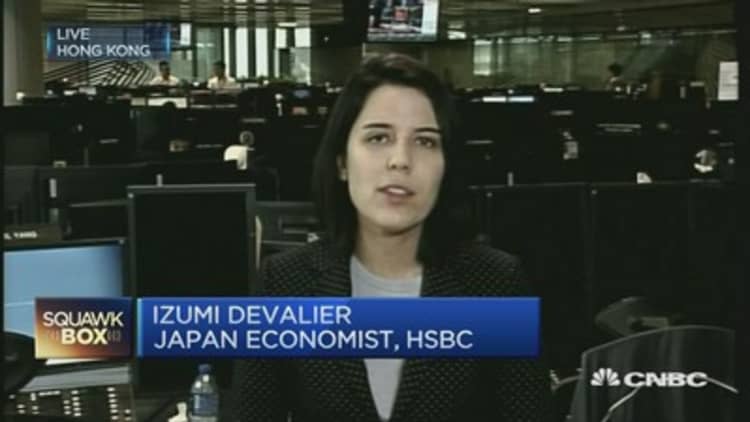
Asian stocks endured a sell-off on Monday, with airline operators and tourism-related plays among the hardest-hit, as sentiment was badly dented by Friday's brutal terrorist attacks in Paris.
The attacks, which occurred across seven locations, leaving 132 people dead and hundreds more injured, will likely have a "short, sharp effect" on equity markets, analysts say.
"The horrific events in Paris on Friday are likely to have a short, sharp effect in markets but in the long-term, real effects are more likely to influence political risk than the markets themselves," IG's market strategist Evan Lucas wrote in a note issued early Monday.
Meanwhile, U.S. stock futures fell on Sunday, with the Dow futures down 150 points and the S&P futures declining 0.76 percent in early Asian trading. European equities were also not spared amid the latest tragedy; the London FTSE index is expected to open 1.8 percent lower, the German DAX down 2 percent and the French CAC losing 3.7 percent, according to spread better IG.
"[The attacks] could have a significant effect as we saw markets quickly sold off at the close as the attacks took place... so that would equate to about 100 more points off the Dow and about 10-15 more points on the S&P. [Markets] might get worse as we see some fear, "Todd Horwitz, chief strategist at Bubbatrading.com, told CNBC's "The Rundown."
Major U.S. averages each lost more than 1 percent on Friday, pressured by a continued decline in oil prices, a sell-off in tech firms and soft reports on the health of the consumer. Wall Street ended the week down more than 3.5 percent, marking their worst since the week ended August 21 and breaking a 6-week winning streak.
On the other hand, commodities like gold and oil advanced as the rise in geopolitical risks prompted a flight to safety.
Safe haven bids bolstered the price of gold, with spot gold jumping 1 percent at $1,091.70 an ounce after touching near six-year lows on Friday.
West Texas Intermediate crude was last seen 0.8 percent higher at $41.05 a barrel in early Asian trade, while Brent rose 1.1 percent to $44.96 a barrel.
There was also broad-based buying of the yen which was last seen 0.1 percent higher at 122.47 per dollar. The euro, meanwhile, came under heavy selling in the wake of the attacks with the single currency falling 0.5 percent to 133.24 against the Japanese yen in early Asian trade.
China stocks rebound
Share markets in China turned positive in late-day trading, with the key Shanghai Composite index closing up 0.7 percent.
The CSI300 index of the largest listed companies in Shanghai and Shenzhen also rebounded 0.5 percent late Monday, while small-caps made bigger advances with the ChiNext start-up board leaping 3.1 percent.
However, Hong Kong's Hang Seng index tracked the slide across Asia, down 1.5 percent at a near six-week trough.
Earlier in the session, China stocks were hurt by dampened risk appetite due to the Paris attacks, and as investors reacted to the announcement from the China Securities Regulatory Commission (CSRC) late Friday that margin finance requirements will be raised to 100 percent from 50 percent, effective November 23.
Chinese stock indexes have regained their composure in November, following a dramatic meltdown in summer, helped by a steady rise in margin trading. As such, analysts say the move to tighten margin finance requirements was a "preemptive strike against irrational exuberance" that contributed to the stock market crash in June and July.
"We expect more steps will be needed because of the attractiveness of the stock market where the government is pursuing pro-market reforms and the central bank is increasing accommodation," Tim Condon, head of research for Asia at ING Financial Markets, wrote in a note on Monday.
The majority of sectors reversed early losses in the afternoon trading session, but airlines remained in the doldrums on concerns that people will travel less following the latest terrorist attack. Air China, China Eastern Airlines, China Southern Airlines slumped about 2 percent each in Shanghai, while Cathay Pacific receded 2 percent in Hong Kong.
Read MoreWhy isn't the yuan rising despite IMF support?
In other news, the Chinese , also known as the renminbi, moved closer to joining other top global currencies in the International Monetary Fund's (IMF) Special Drawing Rights (SDR) basket after staff at the fund gave the move a thumbs-up. IMF chief Christine Lagarde also said Friday that she supports the findings in her staff's proposal to include the Chinese currency in its benchmark foreign exchange basket.
Nikkei loses 1%
Japan's Nikkei 225 index fell to its lowest level in a week, but hopes for further stimulus from the Bank of Japan (BOJ) helped to offset some of the risk-aversion sparked by the tragedy in Paris.
Released before the market open, preliminary figures for Japan's third-quarter gross domestic product (GDP) showed the world's third-largest economy slipping back into recession. The economy shrank an annualized 0.8 percent in the July-September period, government data showed early Monday, worse than the expected 0.2 percent contraction and following a 1.2 percent fall in the preceding quarter due to a drop in capital spending and weakening external demand across Asia.
But investors interpreted it as heightened possibility for the central bank to step up its already massive quantitative and qualitative easing (QQE) program, analysts said.
Export-oriented plays were among the hardest-hit; Toyota Motor declined 1.5 percent, while Sony and Toshiba closed down 2 percent each.
Within the aviation and tourism sectors, Japan Airlines and ANA Holdings retreated about 3 percent each. Travel agency stocks also lost ground, with H.I.S. Co, KNT-CT Holdings Co and Eurasia Travel nosediving between 3.3 and 5 percent.
Read MoreParis attacks to weigh on already-frail market sentiment
ASX eases 0.9%
Australia's index finished at a one-and-a-half-month low, despite coming off the day's lows as oil and gold-related counters rose on the back of firmer commodity prices.
Earlier on in the morning session, the benchmark index had plunged as much as 1.1 percent to an intra-day low of 4,979 points, which marked the bourse's lowest level since September 30.
Gold producers such as Newcrest Mining and Evolution Mining were among the day's best performers, climbing up 2 percent each. Meanwhile, oil and gas producers Woodside Petroleum, Santos and Oil Search erased early losses to end up between 1.3 and 4 percent.
Large-cap Telstra also helped to offset some losses by adding 0.4 percent.
But all four major lenders dwindled in the red, with Westpac being the biggest loser, down 1.6 percent amid heightened uncertainty. Airlines Virgin Australia Holdings and Qantas Airways lost 6.5 and 1.7 percent respectively.

Kospi skids 1.5%
South Korea's Kospi index settled at 1,943.02 points — its lowest close since September 30 — with airlines and tourism-based counters being the epicenter of Monday's sell-off.
Korean Air Lines and Asiana Airlines closed down 3.3 percent each, while the country's biggest travel agent Hanatour Service plummeted 8.9 percent.
Blue chips also contributed significant downside pressure, with Samsung Electronics and Posco losing 2.9 and 3.2 percent respectively.
Lotte Shopping slumped 5.7 percent on the back of news that Hotel Lotte Co. lost its license to run a duty-free retail outlet in downtown Seoul to Doosan Corp. The loss of the license comes amid a power struggle between the retail conglomerate's chairman Shin Dong Bin and his elder brother.
By contrast, Shinsegae shares outperformed with a rise of 3.5 percent, after it was granted licenses to operate duty-free stores in Seoul.
Hanwha Chemical Corp also bucked the downtrend, up nearly 12 percent, on the back of strong third-quarter earnings results.
Rest of Asia
Elsewhere in the region, equity markets largely languished in a sea of red.
Thailand's index recovered after an early fall and finished up 0.5 percent, withdomestic funds seen buying shares, according to a Reuters report.
Meanwhile, data released earlier showed the economy growing 1 percent in the third quarter on a seasonally-adjusted basis, up from 0.36 percent in the April-June period. On an annual basis, growth in the Southeast Asia's second-biggest economy picked up pace to 2.9 percent, improving slightly from second quarter's 2.8 percent.
Despite the better-than-expected GDP figure, analysts at Barclays say Thailand's growth prospects remain lackluster.
"Even with today's upside surprise, domestic growth remains sluggish in Thailand, with public sector spending and weak imports being the key growth drivers. Exports remain soft, and domestic demand, particularly private consumption and private investment, remain under pressure. Although we continue to expect a modest pickup in domestic demand from the fiscal side, the drag from agriculture and rural incomes is likely to weigh on any recovery," Singapore-based Rahul Bajoria wrote in a note released Monday.
Thailand's tourism and leisure sub-index, which tracks the overall tourism market, sagged 1 percent in the wake of last week's deadly attacks in France. Among laggards, Airports of Thailand, Central Plaza Hotel and Erawan Group declined between 0.5 and 1.8 percent.
In India, the BSE Sensex and the 50-share Nifty indexes recovered from a weak open, steadying at 0.6 percent higher, after wholesale prices chalked up their 12th straight month of declines in October. The wholesale price index (WPI) fell an annual 3.81 percent in October from a year earlier, government data showed, compared with a drop of 4.54 percent in the preceding month.
At the market open earlier, the bourses declined over 100 points each, tracking heavy selling in regional markets.

